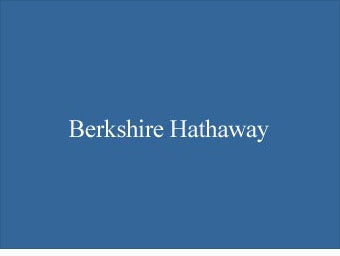Happy Friday! There are more good news articles, commentaries, and analyst reports on the Web every week than anyone could read in a month. Here are eight fascinating ones I read this week.

Fortune re-published an article that first went to print in 1970, which includes one of the first public references to some guy named Warren Buffett:
To call the Buffett operation a hedge fund is accurate only in the sense that Warren E. Buffett, 39, the general partner, shares in the profits of the limited partners. (Under his quite unusual arrangement, the limited partners annually keep all of the gains up to 6 percent; above that level, Buffett takes a one-quarter cut.) Otherwise, he is set apart from the regular hedge funds by the fact that he has invested almost exclusively in long-term “value” situations. Buffett’s record has been extraordinarily good. In his thirteen years of operation, all of them (including 1969) profitable, he compounded his investors’ money at a 24 percent annual rate. Recently, the partnership’s assets stood just above $100 million.
But now, to the immense regret of his limited partners, Buffett is quitting the game. His reasons for doing so are several, and include a strong feeling that his time and wealth (he is a millionaire many times over) should now be directed toward other goals than simply the making of more money. But he also suspects that some of the juice has gone out of the stock market and that sizable gains are in the future going to be very hard to come by. Consequently, he has suggested to his investors that they may want to take the “passive” way out, investing their partnership money not in the stock market but instead in municipal bonds.
Slim pickins
Calculated Risk shows the incredible decline in housing inventory. This will help the market recover:

Moore’s law
Remember Watson, the computer that won Jeopardy? He’s selling out:
Pricing was not disclosed, but hospitals and health care networks who sign up will be able to buy or rent Watson’s advice from the cloud or their own server. Over the past two years, IBM’s researchers have shrunk Watson from the size of a master bedroom to a pizza-box-sized server that can fit in any data center. And they improved its processing speed by 240%. Now what was once was a fun computer-science experiment in natural language processing is becoming a real business for IBM and WellPoint, which is the exclusive reseller of the technology for now. Initial customers include WestMed Practice Partners and the Maine Center for Cancer Medicine & Blood Disorders
Bill Miller is bullish
Value investor Bill Miller of Legg Mason shares his thoughts with the Financial Times:
He [Miller] says there is a big structural demand for homes due to a growing population and a lack of building during the bust, when fewer than 500,000 new homes a year were built. The long-term trend is for 1.4m to 1.5m new homes a year, so to catch up “we probably need to get to 2m housing starts at some point in the next five years.”
Such long-term optimism is in part what helped the value investor to embrace technology in the 1990s, and he remains a fan of the big technology names “priced with no regard to the underlying fundamentals.”
For instance, were Apple Inc. (NASDAQ:AAPL) to keep all $137bn on its balance sheet and just put future free cash flow into the dividend, “that alone would put the stock up close to 50 per cent.”
This should end well
Stephen Gandel in Fortune worries about banks’ exposure to bonds at a time when bonds look dangerously overpriced:
Bank of America Corp (NYSE:BAC) prefers investors focus on effective duration. In its most recent 10-Q, B of A told investors that it held $33 billion, or just 11% of its overall debt portfolio, in bonds that won’t get paid back for at least a decade or more, down significantly from the quarter before.
Take a look the numbers B of A reported to the FDIC, which requires banks report durations based on the date on the bonds, and not best guesses, and you get a very different picture. By those numbers, B of A appears to have around 90% of its portfolio, or $266 billion, in bonds that won’t come due for 10 years or more.
If that is right, a 1% rise in interest rates could cause B of A to lose nearly $30 billion, or five times what JPMorgan lost on the recent London Whale debacle. That’s not enough to blow away the bank should the bond bubble burst — it has nearly $250 billion in capital — but it’s certainly enough to sting, a lot.
Big wrong
Nassim Taleb throws cold water on Big Data:
We’re more fooled by noise than ever before, and it’s because of a nasty phenomenon called “big data.” With big data, researchers have brought cherry-picking to an industrial level.
Modernity provides too many variables, but too little data per variable. So the spurious relationships grow much, much faster than real information.
In other words: Big data may mean more information, but it also means more false information.
Wisdom
Blackstone Advisory vice chairman Byron Wien shares a list of wisdom learned in his 80 years on Earth. My favorites:
Network intensely. Luck plays a big role in life and there is no better way to increase your luck than by knowing as many people as possible. Nurture your network by sending articles, books and emails to people to show you’re thinking about them. Write op-eds and thought pieces for major publications. Organize discussion groups to bring your thoughtful friends together.
Evolve. Try to think of your life in phases so you can avoid a burn-out. Do the numbers crunching in the early phase of your career. Try developing concepts later on. Stay at risk throughout the process.
Heir apparent
Bloomberg talks with Warren Buffett’s son, Howard, who is set to become Berkshire Hathaway Inc. (NYSE:BRK.A)‘s chairman after his father’s passing. Watch it here.
Enjoy your weekend.
The article 8 Fascinating Reads originally appeared on Fool.com and is written by Morgan Housel.
Morgan Housel has no position in any stocks mentioned. The Motley Fool recommends Apple and Berkshire Hathaway. The Motley Fool owns shares of Apple, Bank of America, and Berkshire Hathaway.
Copyright © 1995 – 2013 The Motley Fool, LLC. All rights reserved. The Motley Fool has a disclosure policy.





